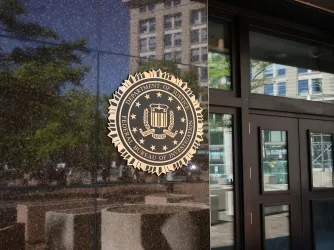Table of Contents
The lessons of the University of Pennsylvania’s notorious “hate preachers”

When the weather is nice on Penn’s campus, the preachers are as impossible to avoid as a stray frisbee or music blasting from a portable speaker. You’ll see the preachers around College Green, flapping their signs and attempting discordant chants. For over 20 years, Penn has had periodic visits from Brother Stephen, Brother Aden, Brother Ross, and other members of various Christian groups who assemble on campus to spew insults at women, queer people, Catholics, and Jews. For Penn students, it instills a vague sense of solidarity — no matter our race, religion, or gender, we’re all damned in the eyes of the street preachers.
I’ve been called a slut, a whore, and a fornicator in quick succession while walking by a demonstration. I’ve been told that I should make a man a sandwich. I’ve been told that I’m going to hell, and that I deserve to be raped. It’s heavy stuff for anyone to hear, especially when you’re already stressed and late for a calculus recitation.
When I first arrived on campus as a newly-minted adult, I couldn’t believe Penn would tolerate this kind of conduct. As a private university, Penn has significant leeway to regulate unaffiliated persons’ use of the campus, including its outdoor areas. But its green light policies, which only govern the time, place, and manner of demonstrations for students and faculty, are emblematic of the fact that Penn “cherishes the [concept] of freedom of thought” in both policy and practice. So even though its policies are much more vague when it comes to the rights of “Non-University Persons,” the preachers have never been denied their spot outside the library on those sunny Philly days.
So, sure, the preachers’ demonstrations are permitted by the university, but doesn’t it hurt students to be faced with such vile invective on campus, where we’re supposed to be safe? It’s certainly hard to see the intellectual value in debating or engaging with people who would call a complete stranger a fornicator to her face.
But facing this kind of speech serves as the perfect sparring ground for students learning to think for themselves, find their voice, and develop the emotional armor of adulthood, during which they’ll have to face hateful, rude, and intolerant speech regularly. These preachers are easy foes, two-dimensional villains spouting nothing more than unoriginal, generic hate. There is no sophisticated argument. With practice, students learn to recognize when speech is simply too ridiculous to merit an emotional response, too juvenile to be worthy of outrage or censorship efforts.
At Penn, student activists have developed a large toolkit for responding to the preachers’ hateful speech. In 2016, a visit from Brother Ross inspired an impromptu pride demonstration led by a group of students wielding rainbow flags. In another instance, students created their own posters for a tongue-in-cheek counterprotest in support of the Attic, an LGBT youth center. Using humor, quick retorts, or a simple eye-roll, we make it known that while these preachers have the right to their signs and chants, we have the right to use our own voices to respond (or not). The success of these efforts shows that countering bigotry not with suppression, but with more speech, allows students to resist intolerance while not wavering in support of free expression.
Universities are meant to instill in students the value of maturity, critical thought, and having a sense of humor about the world around you. The preachers’ presence at Penn and other colleges gives students an opportunity to employ their own right to free speech, while respecting others’ right to do the same. Whether we engage with hateful speech, use it to spark deeper discussion, or simply learn to let it roll off of us, these tools are much far more effective than censorship or shutting speakers down — even when the speech is as boorish as Brother Stephen’s.
Cecelia Vieira is a rising junior at the University of Pennsylvania and FIRE Summer Intern.
Recent Articles
Get the latest free speech news and analysis from FIRE.

Remembering 'free-thinking' writer Nat Hentoff
Podcast

VICTORY: Court vindicates professor investigated for parodying university’s ‘land acknowledgment’ on syllabus

Can the government ban controversial public holiday displays?
